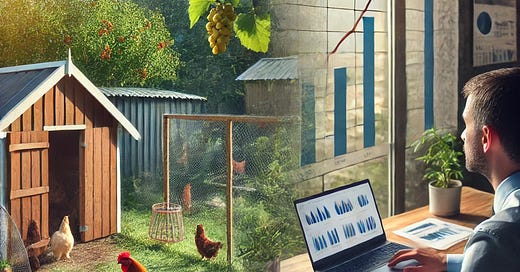When we moved to a new place back in 2015 with a large backyard, we were not planning on creating a small ecosystem populated by all sort of animals. It started with just some above ground planting boxes and using some terrace technics to create a vegetable and herbs garden. There was already a lot of fruit trees, almost like an orchard with peaches, lemons (a lot!), oranges, figs, cherries, grapefruits, Mexican Guava, apricots and some passion fruits.
We kept going adding seasonal fruits and vegetables to our now “almost domesticated” backyard. It was exhilarating to have an almost self-sustaining production of backyard to table food.
And then my wife talked about chicken and her childhood memories. Oh my. It started a cycle of adding animals to our planting efforts. We create a mini zoo with dogs, cats, tortoises, chicken as “domesticated” while all sort of birds, rodents and reptiles starting joining the new “park vibe” backyard (It does help to have massive matured trees).
Of course, having this complex mini ecosystem doesn’t come without its challenges. Finding a house sitter is not for the weak of heart, cost of maintenance and feeding is not “light" and of course, the dependency of the clemency of the weather is permanent. But the rewards are great. And more importantly, it has helped me become a better manager. How? Let’s dig into that.
Backyard Farming: A Path to Becoming a Better Manager
In today’s fast-paced world, filled with non-stop notifications, meetings, and deadlines, finding authentic focus can feel like an impossible feat. As a manager, you’re expected to balance the needs of your team, execute on company goals, and foster innovation—all while keeping your cool. For me, backyard farming has emerged as an unlikely, yet powerful tool to bring calm, clarity, and sharper focus to the way I lead. Whether it’s tending to my chickens, nurturing an orchard, or cultivating grapes (yes, the French side of me commanded that I added few of these to our yard), these moments in the garden have become a source of balance and grounding, ultimately making me a better manager.
The Art of Patience
One of the first lessons backyard farming teaches is patience. Nature operates on its own timeline—fruits take months to ripen, chickens need time to mature before they lay their first egg, and grapevines grow slowly before yielding wine-worthy fruit. This process instills the understanding that not everything is instant, just like the growth and development of a team or a business project. As a manager, embracing patience allows for the organic growth of your team, knowing that results may not always be immediate, but with care and attention, they will come.
Fostering Consistency and Care
As patience is a great virtue, nurturing team members requires also constant attention. Daily routines in backyard farming provide structure and regularity. You can’t skip feeding your chickens or watering your plants, or you risk consequences down the line. This mirrors the importance of consistency in leadership. Your team relies on you to be present, to communicate clearly, and to provide steady guidance. Through farming, I’ve learned that small, consistent, voluntary and regular efforts lead to big payoffs—whether it’s seeing your garden flourish or watching your team hit their stride.
The Power of Mindful Breaks
The moments I spend outdoors—attending to various animals needs, gathering eggs, pruning trees, or harvesting grapes—are calming, mindful breaks from the noise of the corporate world. These activities require my attention but not in the overwhelming, high-stakes way that a boardroom meeting does. These breaks offer me mental clarity and space to reflect. They remind me of the power of pause, something that is critical in decision-making. As a manager, these moments of calm help you return to work refreshed, with a clearer vision and a steadier hand. The capacity to hit the “Pause button” is one of the most undervalued skills in management as we constantly judge success by moving forward.
Managing Complexity with Simplicity
Farming is complex in its own right, but at the heart of it, simplicity reigns. Plants need water, sunlight, and nutrients to grow. Chickens need food, shelter, and a safe environment. While managing a team may seem infinitely more complex, the principles are surprisingly similar. People need clear goals, support, and the right resources to thrive. Backyard farming has helped me strip away the distractions and focus on providing my team with what they truly need to succeed.
A Return to Authenticity
There’s something authentic about watching a seed you planted grow into a tree, or witnessing the cycle of life with your chickens. It’s humbling and rewarding in a way that reminds you of the importance of grounded, human experiences. As a manager, being authentic is critical to building trust and rapport with your team. The connection you build with nature—rooted in authenticity—translates to how you show up at work. You learn to be more present, more empathetic, and more understanding. You improve as a caring human.
Long-Term Thinking
Farming teaches you to think long-term. It’s about planning seasons ahead, nurturing plants that may not bear fruit for years, and making sure the soil stays healthy for future harvests. This long-term perspective is invaluable in management. It helps you plan strategically, invest in the right people, and ensure that your decisions today will benefit your team and your organization down the line. And it also helps dealing with the short-term urgencies. A disease, an injury, a weather catastrophe, may distract you in the short term, the important to keep an eye on the end-game (for me, it’s a fresh home-made tart for example) is no different than dealing with difficult employees or unclear corporate directives. Learning to adapt and “fix” the immediate for a better longer term outcome is another great skill to help prioritize.
Grounded Leadership
Backyard farming has become more than just a hobby—it’s a daily reminder of the value of patience, consistency, mindfulness, simplicity, and authenticity in leadership. When I step outside to tend to my chickens or prune my orchard, I’m not just working the land; I’m cultivating the qualities that make me a better manager.
It may be cliche but just getting barefoot in a patch of grass feeling grounded, or smelling beautiful flowers or the dirt in the ground after a fresh rain, has definitely some therapeutic virtues hard to explain. Being in community with nature is no different than being grounded and connected with your team.
So, for anyone looking to reconnect with authentic focus, regain balance, and lead with a calmer mind, backyard farming just might be the perfect antidote to modern management burnout.







